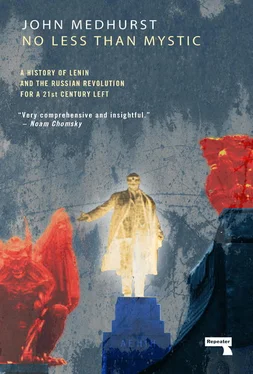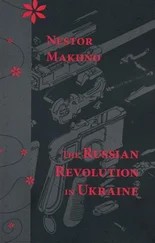In October 1918 the Menshevik CC announced that it accepted the October Revolution had been “historically necessary”. It no longer sought convocation of the Constituent Assembly, although it did not compromise its position on civil liberties. It still demanded “the abolition of the extraordinary organs of police repression and of the Extraordinary Tribunals, and the cessation of all political and economic terror”. It rejected any policy that “strove to turn the class dictatorship of the proletariat into a rule over state and society on the basis of the political disenfranchisement of all nonproletrian strata of the population, a fortiori the dictatorship of one section of the proletariat”. 35However it accepted that it would now campaign solely within the Soviets and the Soviet Executive.
On 30th November, in response to Martov’s new policy and needing every atom of support it could secure, Sovnarcom tentatively re-legalised the Menshevik Party and allowed its deputies back into the Soviets. The Menshevik Party would only ever be semi-tolerated. After it began to notch up serious majorities within the Soviets in 1919 it would again be subject to censorship and persecution, but for a brief period, with White counter-revolutionaries almost at the gates of Petrograd and Moscow, the RSDLP stood together one last time.
The siege conditions and sacrifices in Petrograd and Moscow created intense camaraderie and solidarity. The Kronstadt naval base was struggling to hold out. On 2nd June Serge reported to his diary, “The White army is gathering outside Petrograd”. A few days later he wrote, “Hunger is permanently established in at least 300,000 homes. Anxiety is everywhere […] Queues of fifty to a hundred people stand outside the bakeries where the commune distributes to everybody the bread it has available”. Most Petrograd workers bought bread illegally on the black market. Many foraged in the dangerous country outside the city instead of going to work. Yet despite the appalling privation and fear of what the White armies would do if they took the city, Serge found that many of its defenders still held musical concerts and listened to opera and poetry recitals. For him the inspiring example of the armed communists, especially the youngest fighters, meant “We shall not be destroyed! This soul of the revolutionary city contains too much beauty; this flesh and blood of the city contains too much energy!” 36
For all its heroism and self-sacrifice, the bloody defence of Petrograd inevitably produced more coercion and terror. In response to the defection of some former Tsarist officers from the Red Army to the Whites, on 12th June Izvestia published on its front page a decree from Trotsky and Zinoviev stating, “You are instructed to establish the family situation of all former officers who have been integrated into the command structure of the Red Army and to inform them that the consequences of any treachery will fall on their families”. On 24th June Order No 960 instructed every citizen to carry a “labour certificate” issued at their place of work. Militias and House Committees went from residence to residence enforcing the order. Orders to restrict movement, to check all motor cars, and to register any weapons (on pain of immediate execution) followed. These were all justified by the urgent need to secure the defence of Petrograd against Whites both outside and inside the city. Serge, a truly libertarian socialist, wrote, “Crush this incipient reaction at whatever cost, because if they were to triumph even for a moment it would be a calamity for the whole of humanity”. 37
On 17th October Yudenich’s forces were only twenty-five miles from the city. On 19th October they were nine miles away. “It seemed quite plainly to be our death agony”, wrote Serge years later. 38Bill Shatov took a few thousand men out to meet Yudenich’s force of 15,000, not expecting to return. With the city about to fall, the Politburo sent Trotsky to oversee the defence. Upon arrival he found Zinoviev, the boss of the Petrograd Branch of the RCP, stretched out on a sofa in utter despair, his officials defeatist. “As usual in such situations I turned to my trainforce, men who could be depended on under any circumstances”, Trotsky wrote in his autobiography, referring to the militarised train that took him from front to front in the Civil War:
They checked up, put on pressure, established connections, removed those who were unfit, and filled in the gaps. From the official apparatus, which had become completely demoralised, I descended two or three floors to the district organisations of the party, the mills, the factories, and the barracks. 39
Trotsky’s arrival turned the tide. As even his political enemy Lashevich later admitted, “Trotsky’s orders, clear and precise, sparing nobody and exacting from everybody the utmost exertion and accurate execution of combat orders, at once showed there was a firm, directing hand”. 40Trotsky addressed an emergency session of the Petrograd Soviet and urged one last, supreme effort. Serge was present and later recorded, “The decision to fight to the death was taken enthusiastically, and the whole amphitheatre raised a song of immense power”. 41
Roads, squares and bridges were barricaded, barbed wire was put up, trenches were dug on the southern approaches. At one crucial moment, when Red Army units had fallen back to Alexandrovka on the outskirts of the city, Trotsky himself mounted a horse and rode up and down under fire, turning them around and inspiring them to hold firm. On 21st October, on the Pulkovo Heights over Petrograd, the reinforced Red Army made its final stand against Yudenich’s advancing forces and defeated them. Yudenich fell back to Estonia. Shortly after, in November, Admiral Kolchak’s forces were ejected from Omsk, their Siberian capital. The threat from the Whites was over.
The heroic last-ditch defence of Petrograd in October 1919–and the eventual defeat of all the White armies and their foreign allies by the more cohesive force of the Red Army–was the Soviet Union’s “creation myth”, as much as was the storming of the Winter Palace. It inspired and mobilised not only convinced Bolsheviks but all in the city who fought for democracy and social liberation against the reactionary forces of Old Russia, of autocracy, militarism, privilege and anti-Semitism. The tragedy for those Mensheviks, libertarians and anarchists who rallied to the Bolsheviks in their hour of need was that Lenin’s regime did not deserve this support and self-sacrifice. It certainly did not repay it.
Whilst the physical survival of the Soviet regime was decided on the battlefields of the Civil War, other battles, less dramatic but equally important, were being fought. In a regime whose declared mission was to create a fundamentally new society, two of the most important sites of this struggle were the People’s Commissariat of Education (known as Nakompros), and the People’s Commissariat of Social Welfare.
Under the People’s Commissar for Education, Anatoly Lunacharsky, Nakompros was one of the few Commissariats that did not simply rename an old Tsarist Ministry and carry on. It encompassed the old Ministry of Public Education but also integrated the functions of the Palace Ministry, which controlled the Academy of Arts, the imperial theatres and the royal palaces. Lunacharsky encountered the same obstruction from Tsarist civil servants as did other People’s Commissars. He eventually occupied the Ministry on 18th November, where he and his assistants were greeted warmly by technical staff. He issued an appeal for the officials to report for duty on 27th November but nobody came. It was then discovered that officials had taken with them 93,000 rubles from the teachers’ pension fund and refused to return it. 1
Читать дальше












